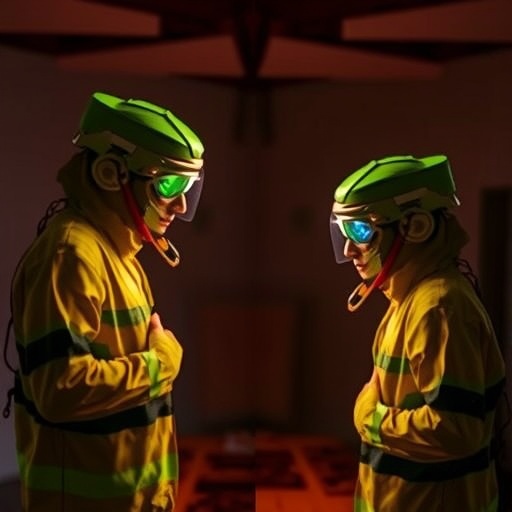In an increasingly health-conscious world where the effects of radiation exposure are more scrutinized than ever, a new study sheds light on an often-overlooked component in the field of healthcare: the radiation protection knowledge of health workers. The research, spearheaded by a team led by Göde, Erdem, and Dadak, explores how the understanding of radiation safety protocols affects the attitudes of healthcare professionals towards radiation exposure. This study not only underscores the importance of education in radiation safety but also has significant implications for hospital protocols and patient safety measures.
Radiation is an essential tool in modern medicine, utilized across various diagnostic and therapeutic applications. However, its potential hazards cannot be overlooked, particularly when healthcare professionals are involved. This newly published study highlights that the knowledge possessed by health workers about radiation protection directly correlates with their attitude and behavior regarding radiation exposure. A significant finding suggests that professionals who are well-informed tend to adopt safer practices, thereby minimizing risks for both themselves and their patients.
The methodology of the study involved a comprehensive survey distributed amongst health workers, assessing their knowledge on radiation protection principles. The survey was meticulously designed to cover a broad spectrum of topics, including the biological effects of radiation, regulatory standards, and best practices for minimizing exposure during procedures. The researchers employed a robust statistical analysis framework that offered a holistic view of the data collected, ensuring the validity and reliability of the findings.
Results from this research reaffirmed a critical link between education and protective behavior. Health care professionals who participated in workshops and training sessions reported higher levels of awareness and understanding regarding radiation safety protocols. The findings point toward the necessity of developing continuous education programs aimed at enriching the knowledge base of health workers. This aligns well with existing recommendations in the literature advocating for ongoing training in the healthcare industry, particularly in fields where radiation exposure is a routine aspect of practice.
Furthermore, the implications of the study extend beyond individual attitudes to influence institutional policy-making. Hospitals and healthcare providers can leverage these insights to design more effective training modules and safety protocols. By investing in regular training sessions, hospitals can foster a culture of safety that emphasizes protective measures against radiation. This, in turn, acts as a dual layer of protection—keeping both workers and patients safe.
The gap between knowledge and implementation of safety standards is an ongoing challenge in healthcare. Many health workers demonstrate a solid theoretical understanding of radiation safety; however, their practical applications often fall short. The study elucidates the need for an integrated approach to training that combines theoretical knowledge with practical, real-world applications. Simulation-based learning, for example, can provide hands-on experience while reinforcing the importance of following safety protocols during actual medical procedures involving radiation.
Interestingly, the study’s findings may also have a ripple effect in educational institutions that train future healthcare professionals. By incorporating radiation protection training within the curriculum, these institutions can prepare students with the necessary skills and knowledge to navigate the complexities of radiation safety effectively. Moreover, emphasizing the ethical considerations associated with radiation exposure can help instill a sense of responsibility among future practitioners.
The conversation surrounding radiation protection is particularly pertinent given the increased reliance on imaging technologies, such as X-rays and CT scans, in diagnostic medicine. The prevalence of these tools raises questions about the cumulative effects of radiation exposure over time, especially for individuals who undergo frequent medical imaging. The authors of the study advocate for a proactive approach, ensuring that healthcare workers are not only knowledgeable but also vigilant in minimizing unnecessary exposure both to themselves and their patients.
One of the standout features of this research is how it highlights the interconnectedness of knowledge and effective patient care. Health workers who understand radiation risks are better equipped to communicate potential hazards to patients, thereby fostering an environment of transparency and trust. Patients can often feel anxious about medical procedures involving radiation, and healthcare professionals’ informed attitudes play a crucial role in alleviating these fears.
As healthcare systems worldwide strive for excellence, studies like these contribute valuable insights that can drive quality improvement initiatives. Moreover, they serve as a reminder that healthcare is not a static field; continuous learning and adaptation are fundamental principles for achieving the best outcomes. The researchers assert that regular assessments of radiation protection knowledge should become a standardized practice in healthcare settings to ensure that professionals maintain a high level of competency.
In conclusion, the investigation into the role of radiation protection knowledge among healthcare workers unveils a critical aspect of patient and professional safety. By recognizing the direct correlation between knowledge and attitude, institutions can make informed decisions that prioritize education and training. This proactive stance not only safeguards health workers but also reinforces the protection of patients, ultimately elevating healthcare standards in an era increasingly defined by technological advancements and a dedication to safety.
These findings present a compelling call to action for both healthcare leadership and educational institutions. Addressing the nuances of radiation protection through comprehensive training initiatives can foster a rigorous culture of safety, influencing the healthcare landscape for years to come. As we navigate the complexities of modern medicine, let us not forget that informed professionals are the backbone of effective patient care.
Subject of Research: Radiation protection knowledge of health workers and its influence on radiation attitude.
Article Title: Investigation of the role of radiation protection knowledge of health workers on radiation attitude.
Article References:
Göde, A., Erdem, H., Dadak, A. et al. Investigation of the role of radiation protection knowledge of health workers on radiation attitude.
BMC Health Serv Res 25, 1394 (2025). https://doi.org/10.1186/s12913-025-13565-0
Image Credits: AI Generated
DOI: 10.1186/s12913-025-13565-0
Keywords: Radiation protection, healthcare workers, patient safety, education, training, attitudes, safety protocols, medical imaging, continuous learning, healthcare standards.




